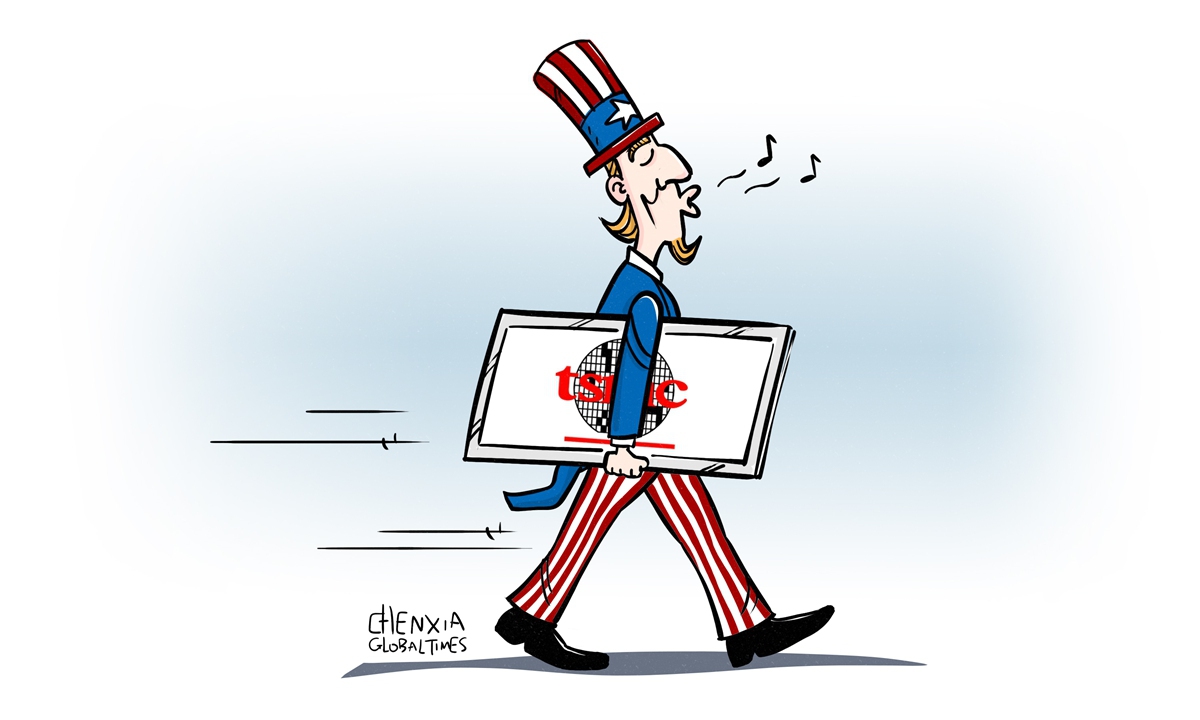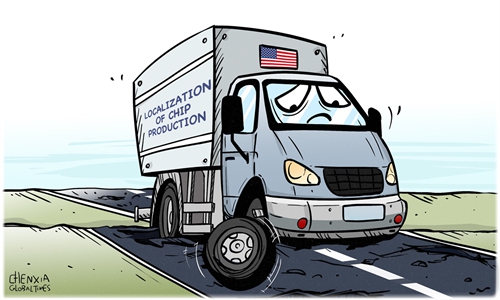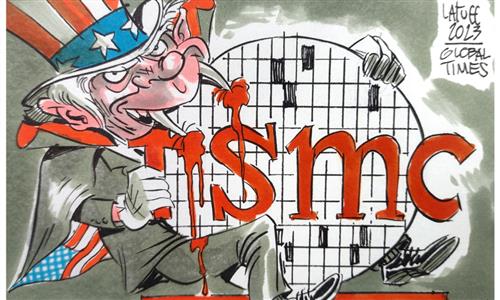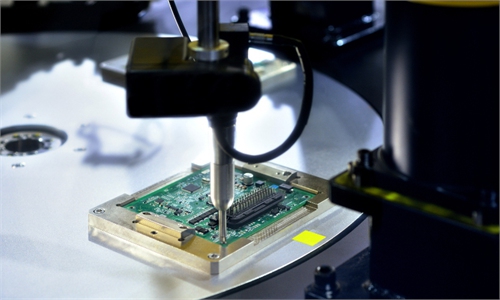
Illustration: Chen Xia/Global Times
There are increasing indications that the US "chip dream" is proving to be a challenging and intricate task, even for the world's largest chipmaker. In light of Washington's predatory practices, it appears that there is limited flexibility. According to The Wall Street Journal(WSJ) on Friday, Taiwan Semiconductor Manufacturing Co (TSMC) said it expected another delay to its second semiconductor plant in the US state of Arizona.The statements by TSMC Chairman Mark Liu at a news conference Thursday offered further evidence of challenges faced by the Arizona project, including a shortage of skilled workers and difficult negotiations over how much money the US government will provide, according to WSJ.
Also, the specific chip that will be manufactured at the second plant has not yet been determined. Customer demand and government incentives will play a role in deciding whether the second factory makes 3-nanometer chips, according to TSMC Chairman Mark Liu. Originally, TSMC had announced the first facility would produce 4-nm chips and the second would make 3-nm chips, which are among the most advanced semiconductors. TSMC had already pushed back the start of mass production at its first plant in the state to 2025 from late 2024.
The development appears to be a setback for the Biden administration's efforts to boost chip manufacturing on US soil, but it actually sheds light on the awkward situation faced by TSMC when it comes to its US factory.
As the world's largest chipmaker, TSMC will undoubtedly be a key target of US plunder. Its outlook in the US is not optimistic. No matter how the US tries to hide it, Washington's attempt to hollow out the Taiwan island's chip manufacturing capability in order to develop its own is no secret at all.
From the very start, TSMC's Arizona plant is not being built on economic considerations. Political pressure and subsidy inducements from Washington were evident throughout the entire decision-making process for TSMC plants in the US. Now, even the subsidies come with harsh conditions, making it difficult to imagine the regulatory struggles and political pressures that TSMC's American factories will face.
Since December, Washington has only announced two relatively small subsidy agreements for chipmakers, and these subsidies have become a point of contention between the Biden administration and TSMC. More than 170 companies have submitted applications for subsidies under the CHIPS and Science Act, which contains more than $50 billion to support the domestic semiconductor industry, according to the US Commerce Department.
With TSMC's share under the undecided funding plan, the conditions that TSMC must agree to in order to receive the money are unprecedented. These conditions include, but are not limited to, requirements for subsidy recipients to share the profits from their factories under certain circumstances and provide detailed information about their operations.
After pressuring and inducing chipmakers to set up factories in the US, Washington has revealed its true intention of exploiting global advanced semiconductor profits and resources.
The goal of the US extends beyond hindering China's technological progress - it includes exploiting the technology and profits of overseas chipmakers to de-globalize the semiconductor industry and concentrate it in the US, asserting dominance in the high-tech sector, which represents the real "chip dream" the US wants to achieve.
What is now becoming increasingly clear and concerning is that the Democratic Progressive Party (DPP) authorities in Taiwan show no resistance to the US' actions of weakening the local chip manufacturing industry. They view the chip sector as a means to gain political support and stir up tension in the Taiwan Straits. Ironically, the secessionist DPP authorities are actually accelerating the decline of the island's chip manufacturing sector.
This is particularly worrisome considering that Taiwan's industries are increasingly concentrated in sectors such as electronics and information technology. If the semiconductor industry in Taiwan is indeed being deceived out of its core technologies and key resources, and if its role in the global semiconductor industry chain is replaced by the US, what will happen to the island's economy? Even for the Chinese mainland, the scenario that the Taiwan island's economy may lose its chip industry is worrying. Therefore, the situation that has occurred with TSMC, and what may happen to it in the future, should serve as a warning that action needs to be taken before it is too late.



